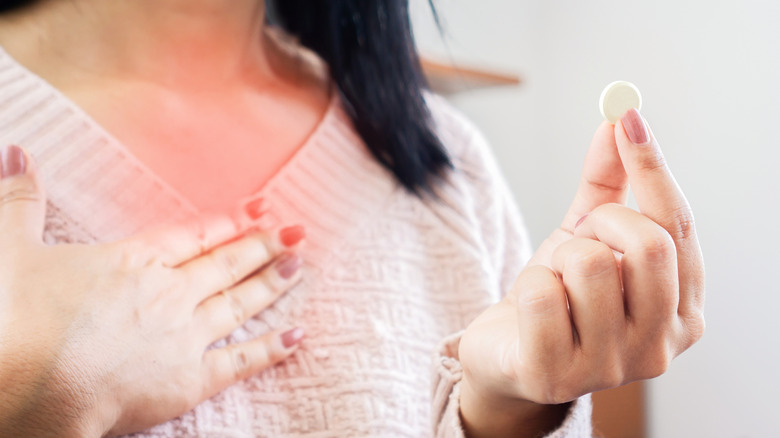What It Really Feels Like When You Have Heartburn
Despite its name, heartburn has nothing to do with the heart. In fact, it's actually a gastrointestinal issue, similar to indigestion (via Healthline).
Heartburn is a common symptom of acid reflux and gastroesophageal reflux disease (GERD). Heartburn is characterized as a burning sensation in the chest and throat that occurs when the acids in your stomach travel back up your throat, irritating the lining of your esophagus. This is often a result of consuming highly acidic foods and drinks like coffee, tomatoes, alcohol, and chocolate.
For most people, heartburn radiates in either the breast bone or at the top of your chest and can worsen when you lean over or lie down, per Healthline. This uncomfortable burning feeling can last anywhere between 30 and 60 minutes, and may even leave a sour taste in your mouth and throat. Although it's rare, some people have also reported feeling discomfort in the lungs, nose, and ears.
How to treat heartburn
Fortunately, there are many over-the-counter medications you can take to treat heartburn. For instance, antacids like Tums are commonly used to help relieve heartburn and indigestion (via the Cleveland Clinic). They work by neutralizing the acids in your stomach, which can help soothe and settle your gut. Acid blockers like Pepcid, on the other hand, also have a similar effect. However, instead of neutralizing stomach acid, they help reduce the production of it.
If neither of those medications prove effective, your doctor might recommend taking proton pump inhibitors. They can help alleviate your heartburn by completely blocking acid production in the stomach. While all three of these medications are available to purchase over-the-counter, prescription-strength antacids, acid blockers, and proton pump inhibitors may be more effective for some people than others. That's why it's best to talk to your doctor to figure out which medication is right for you.
Of course, the best way to treat heartburn is to prevent it from occurring in the first place. You can help reduce or prevent heartburn by avoiding trigger foods, eating more slowly, consuming smaller portions, wearing loose clothing, and not lying down or going to bed right after eating.


